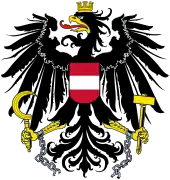Bruno Pittermann | |
|---|---|
 | |
| Vice-Chancellor of Austria | |
| In office 22 May 1957 – 19 April 1966 | |
| Chancellor | Julius Raab Alfons Gorbach Josef Klaus |
| Preceded by | Adolf Schärf |
| Succeeded by | Fritz Bock |
| President of the Socialist International | |
| In office 5 September 1964 – 26 November 1976 | |
| Preceded by | Erich Ollenhauer |
| Succeeded by | Willy Brandt |
| Minister of Transport | |
| In office 14 December 1962 – 27 March 1963 | |
| Chancellor | Alfons Gorbach |
| Preceded by | Karl Waldbrunner |
| Succeeded by | Otto Probst |
| Chair of the Social Democratic Party | |
| In office 8 May 1957 – 1 February 1967 | |
| Preceded by | Adolf Schärf |
| Succeeded by | Bruno Kreisky |
| Personal details | |
| Born | 3 September 1905 Vienna, Austria |
| Died | 19 September 1983 (aged 78) Vienna, Austria |
| Political party | Social Democratic Party |
Bruno Pittermann (3 September 1905 – 19 September 1983) was an Austrian social democrat politician.
Early life
Pittermann was trained in geography, history, and pedagogy. In his youth, he took a job as an education expert in the Chamber of Labor in Klagenfurt. In 1934, he was fired from his job because of his membership in the Social Democratic Party of Austria. Afterwards, he joined the illegal Revolutionary Socialists of Austria (RSÖ) during the Fatherland Front regime.[1] He worked as a teacher while studying for a doctorate in law. After the annexation of Austria in Nazi Germany in 1938, Pittermann was fired from his teaching position.[1]
Post-war activities
He served as both the chairman of the Social Democratic Party of Austria from 1957 to 1967, and the Vice Chancellor of Austria from 1957 to 1966. In 1966, he resigned as head of the party and was succeeded by Bruno Kreisky.[2] From 1964 to 1976, he was president of the Socialist International.
References
- 1 2 Kreisky, Bruno (2000). The Struggle for a Democratic Austria: Bruno Kreisky on Peace and Social Justice. Berghahn Books. p. 375. ISBN 978-1-57181-155-4.
- ↑ Austrian Information. Austrian Information Service. 1966. pp. 1–5.
